
Volume VI/Issue 6/September 2021


From The Editorial Desk
Getting “Back to Normal” Is a Rebuilding Process
In this case when I refer to “normal” I think we can define what we mean. We can look back to 2019 and see where we were and how things were at that time. Of course, the events of 2020 did a lot of damage to our “normal” and sent everything into a down - ward spiral for a time.
Here in 2021 we are building back. Many parishes are at 75–80 percent of their pre-COVID attendance levels. Some may be better than that, some may be worse, but I think we all agree that “rebuilding” is the current “normal.”
That “rebuilding” is truly a process. It takes time. It takes work. It takes patience. It will not be easy, but I don’t recall that “easy” was ever in the mix before and it certainly isn’t now.
But let’s not quibble over the stress. Let’s acknowledge the reality of the issues and deal with them. Let’s give the Lord our full attention and devote ourselves to the tasks He mandates. He is our Source on whom we can always rely. Let’s trust Him and get up every day and give ourselves to the doing of His will.
If we will be diligent in our “rebuilding” we could very well come to a new “normal” that surpasses anything we ever had before.
Whatever the status of our future “normals,” let’s be the Lord’s ambassadors! Let’s be faithful! Let’s sow the seed of the Word of God. Let’s be fruitful. Let's Proclaim the good news of Christ in the Eucharist! Let’s not waste away. Let’s “Engage in the business of serving Jesus until He comes.” (Luke 19:13) every day from early in the day until each day is done. Amen


Are You Ready?
Several Catholics were playing cards, when the question asked: "What would you do, if you knew you had only one hour left to live." There were various answers, such as get to Confession, make a Perfect Act of Charity or Contrition, get on one's knees and pray for that last hour. What would you do?
One man was there, who was later canonized a Saint and he answered, that he would continue doing what he was doing. His reason was simple, if we start an occupation for the love of God, then this is where we should be. "Therefore, whether you eat or drink, or whatsoever else you do, do all to the glory of God." (1 Corinthians 10:31)
One of Saint Alphonsus' Eternal Maxims is: "It is necessary to do what at the hour of death we would wish to have done." In other words, we need to be living the Gospel way of life here and now, rather than put it off for the end of our life. "Watch ye therefore, because you know not the day nor the hour." (Matthew 25:13) Death is coming to us all, and we need to be prepared for death at all times.
And so are we ready for the end of the world, that day, when the world ends for us? In order to be ready, we must have the Spirit of Martyrdom
What is the spirit of martyrdom?
Saint John Eudes gives us had five excellent attributes of the spirit of martyrdom:
1. it is the spirit of strength and constancy which fears only God and sin, and cannot be shaken or overthrown, either by promises or threats, by persuasion or violence.
2. It is the spirit of deepest humility, which feels only horror for the vainglory and publicity of the world, and loves contempt and humiliations.
3. It is the spirit of self-mistrust and of most firm confidence in Jesus Christ our Lord, our Strength, in whom all things can be done.
4. It is the spirit of perfect detachment from the world and everything that is in the world. Those who are to sacrifice their lives to God must also sacrifice to Him all else besides.
5. It is the spirit of most burning love for our Lord Jesus Christ, who leads those animated by this spirit to do all and suffer all for love of Him, who dies and suffered all for them. It so inflames them that, for love of Him, they consider mortification and suffering to be a paradise of joys, to be sought and desired while they avoid and detest the pleasures of this world as much as they would hell itself.
We should be ready to die for Jesus at all times, whether a natural death or having our life taken from us. Saint Thomas Aquinas tells us the martyrdom is loss of life in defense of virtue. Are we living a virtuous life? This is how we should live.
Let us go to our last hour with full consciousness. If we knew that in one hour we would be dead, what would we look back on our life and wish we had done differently. We have already made our last Confession, and realized just how much we have sinned in life. We will wish we had heeded Jesus' advice: "Go now and sin no more." (John 5:14 and 8:11)
We will wish we had thanked God more for all of the many blessings He has sent us. And let us remember that even tribulations are blessings in disguise. God sends them for some good reason and at our particular judgment we will probably find out why.
Have we taken time to adore God, Who is so adorable? Have we truly repented of our sins and begged for God's forgiveness?
Let us not put off to tomorrow, what we ought to do today.
Let us begin everything for the love of God, because this indeed may be our last hour.


God's Word Working Within You
1 Thessalonians 2:13–16
13 Therefore, we also give thanks to God without ceasing: because, that when you had received of us the word of the hearing of God, you received it not as the word of men, but (as it is indeed) the word of God, who worketh in you that have believed.
14 For you, brethren, are become followers of the churches of God which are in Judea, in Christ Jesus: for you also have suffered the same things from your own countrymen, even as they have from the Jews,
15 Who both killed the Lord Jesus, and the prophets, and have persecuted us, and please not God, and are adversaries to all men;
16 Prohibiting us to speak to the Gentiles, that they may be saved, to fill up their sins always: for the wrath of God is come upon them to the end.
My article for the Olive Tree this month is to show how prayer and the Word of God is intimately related in the Scriptures, in the Church and in our Christian experience.
-
The psalmist prays, “Incline my heart to your testimonies” (Psalm 119:36). He prays that he would want to read and meditate on God’s word. Prayer and the word.
-
He prays, “Open my eyes, that I may behold wondrous things out of your law” (Psalm 119:18). He prays that he would see wonders in the law-in the Scriptures. Prayer and the word.
-
Paul says, “Take unto you the sword of the Spirit (which is the word of God). By all prayer and supplication praying at all times in the spirit ” (Ephesians 6:17–18). Take the word praying. Prayer and the word.
-
He says, “Pray for us, that the word of God may run, and may be glorified”. (2 Thessalonians 3:1). Pray that the word would break through and triumph. Prayer and the word.
-
And the apostles said that they should “give ourselves continually to prayer, and to the ministry of the word.” (Acts 6:4). Prayer and the word.
Because the Bible puts them together so closely, and because we believe this juxtaposition (look it up! :) is the key to living the Christian life, I will try to show today with illustrations of how this actually works. The text we will build on is 1 Thessalonians 2:13–14:
1. God has spoken.
Verse 13b: “That when you had received of us the word of the hearing of God, you received it not as the word of men, but (as it is indeed) the word of God” So twice he calls his communication the “word of God.” This is not merely the word of man. Paul is speaking. But it is the word of God. God has spoken and is now speaking through Paul.
We believe that God has spoken in history, and that by inspiration, the Church and the Bible together, and in one accord is the authoritative deposit of that word for all time.
All scripture, inspired of God, is profitable to teach, to reprove, to correct, to instruct in justice,
That the man of God may be perfect, furnished to every good work. (2 Timothy 3:16–17)
2. His word comes to us in human words.
In the middle of verse 13, Paul says, “You received the word of God, which you heard from us.” You heard God’s word from us. We are human. God is divine. We are speaking on his behalf. His word is heard in human words.
Christ had appointed apostles who would be his authoritative spokesmen. He teaches and guides and inspires them (and a band of brothers close to them) and they speak his word on his behalf with his authority.
Paul said in 1 Corinthians 2:13, “We impart [God’s truth] in words not taught by human wisdom but taught by the Spirit, interpreting spiritual truths to those who are spiritual.” This is what we have in the New Testament — God’s word mediated to us in the divinely taught words of men. God’s words come to us in human words. When God breathed out, (that is what inspiration means) words that had a medical connotation to them, He formed Luke in the womb of his mother. God knew him: and before Luke came forth out of the womb, God sanctified Him for the work of writing his gospel. Jeremiah 1:5
3. The Thessalonians heard the words of Paul.
Verse 13b: “When you received the word of God, which you heard from us. . . .” God spoke, humans gave his word through their words, and the Thessalonians heard that.
God uses humans to deliver his word, and he delivers it to humans. Human minds hear and understand the word from God, and then another set of human minds receive it from those human mouths and again hear and understand it.
Nothing has been said yet about how the Thessalonians have evaluated the words. Only that they are hearing, and by implication, they are construing. They are trying to make sense of what they hear. That’s what we do when we hear someone speak. So the Thessalonians heard the words of Paul.
4. As they heard, God acted on their minds and hearts.
What did he do? And how do we know this?
What he did was enable them to receive Paul’s words as the word of God. Verse 13b: “When you received the word of God, which you heard from us, you accepted it you received it not as the word of men, but (as it is indeed) the word of God” That’s what God did. He opened their mind and heart to know that Paul was speaking the word of God, and he gave them the inclination to receive it for what it is, not mere human words, but God’s word.
How do we know God did this? Because at the beginning of verse 13, just before saying that they received his word as the word of God, Paul says, “Therefore, we also give thanks to God without ceasing ” For what? “because, that when you had received of us the word of the hearing of God, you received it not as the word of men, but (as it is indeed) the word of God ”
But why would Paul thank God for this? Why would he thank God that the hearts of the Thessalonians grasped the divine nature of the human word? Why would he thank God that the hearts of the Thessalonians embraced the human words as divine word? The reason is that God enabled them to do this.
It’s the same as when Peter said to Jesus: “You are the Son of God,” and Jesus responded, “Flesh and blood has not revealed this to you, but my Father who is in heaven” (Matthew 16:17). In other words, God enabled Peter to see that the human person of Jesus was more than human. And God enabled the Thessalonians to see that the human words of Paul were more than human.
“We give thanks to God that . . . you received our word not as the word of men but (as it is indeed) the word of God.” We thank God because God gave you eyes to see the word for what it really is.
If you have welcomed the gospel as God’s word and believed, that’s how it happened to you. God opened your eyes. God inclined your heart. You saw in the words of man, the word of God (see John 8:47; 18:37; 1 John 4:6).
5. The Thessalonians accepted Paul’s word as the word of God.
We’ve said it, but it deserves its own point. Point 4: God acted. Point 5: the result was that the Thessalonians accepted Paul’s word as God’s word.
There is another word for this reception in verse 13: belief, or faith, or trust. “you received it not as the word of men, but (as it is indeed) the word of God, who worketh in you that have believed.” They believed...they were believers. Paul is calling them believers now precisely because they accepted his word as God’s word.
So saving faith, involves the work of God, opening the eyes of our hearts (Ephesians 1:18) to see Paul’s message as God’s word and accept it, embrace it, receive it. Faith doesn’t look at the word of God from a distance and pronounce it true. It takes hold of it, receives it, takes it in, embraces it.
“As the word of God!” That is, as supremely valuable. Precious. All important. So the Thessalonians accepted, welcomed, received, embraced Paul’s message as the very word of God, as supremely important and precious and valuable in their lives. It was received as a treasure —whose value is only exceeded by God.
6. This word of God was now at work in the Thessalonians.
Verse 13b: “you had received of us the word of the hearing of God, you received it not as the word of men, but (as it is indeed) the word of God, who worketh in you that have believed. ” So God acted to cause them to welcome the word. And now the word itself is living and active in them.
For the word of God is quick, and powerful and more piercing than any two edged sword; and reaching unto the division of the soul and the spirit, of the joints also and the marrow, and is a discerner of the thoughts and intents of the heart. (Hebrews 4:12)
And what specifically was the effect of this working? That’s the last observation.
7. The working of God’s word produced joyful endurance in suffering.
Notice the connection between verses 13 and 14. End of verse 13: “which is at work in you believers. For you, brothers, became imitators of the churches of God in Christ Jesus that are in Judea. For you suffered the same things from your own countrymen as they did from the Jews.”
Paul is giving evidence that God’s word is at work in them. And he says that receiving Paul’s word as the word of God had led to suffering. But that by itself would not prove God’s word was at work in them, because they might have responded to their affliction with anger and doubt and unbelief. But they didn’t. How do we know that? Because Paul had already said it clearly, which is why he didn’t need to here. Look at 1 Thessalonians 1:5–6:
For our gospel hath not been unto you in word only, but in power also, and in the Holy Ghost, and with full assurance, as you know what manner of men we have been among you for your sakes. And you became followers of us, and of the Lord; receiving the word in much tribulation, with joy of the Holy Ghost:
By the Holy Spirit, God had powerfully given them joy in the midst of their affliction. “Our gospel came to you in power and in the Holy Ghost . . . And you received the word in much affliction, with the joy of the Holy Ghost.”
Now when we go back to 1 Thessalonians 2:13–14 we see how God does this. He does it by his word. Verse 13, at the end, “but (as it is indeed) the word of God, who worketh in you that have believed. For you, brethren, are become followers of the churches of God which are in Judea, in Christ Jesus: for you also have suffered. . . .” Indeed you suffer with joy. Joy in the Holy Spirit.
The Holy Spirit was giving them joy in suffering by the working of the word in their hearts and minds. This is what it means for the word of God to be at work in those who believe.

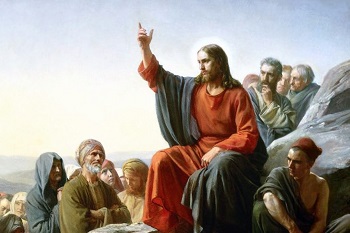
Training in the Spirit
1. Kerygma - Receiving God's word both personal and public. Personal through meditation on the word of God ; Public by joining Recollections and Retreat organize by our Church.
2. Leitougia - Worshipping the Lord or Adoration. Both personal and public. Personal through private prayers; Public by means of the Holy Sacrifice of the Mass. Of course, not the Novus Ordo Missae but the Mass of all times : The Mass of Pius V.
3. Diakonia - Service. This can be personal by the practice of virtue like humility or can be public through spiritual and corporal works of mercy.
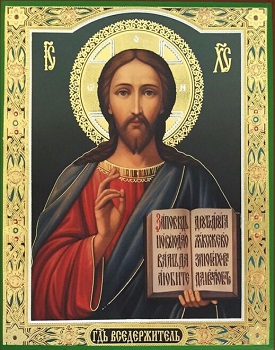
Learning and Responsibilty
One thing that I think we do well to learn as we hear the teaching of our Lord and of the Apostles is that - as the Scriptures attest - that we are to be doers of the word, and not hearers only.
Now, of course, we should be hearers, we should be attentive and receptive to the words and the lessons which are presented to us. But if we are attentive, we will see that the lessons that we receive are not merely information to store away, things to hear by ear, but the lessons are challenges to us. Challenges in grace. Opportunities to grow, to reflect, and - above all - to take responsibility.
That can be a heavy word: Responsibility. It comprehends a lot, depending on the circumstances. But breaking it down into its parts: response - ability, we see that it is simply the ability to make response. The ability to answer.
As a good example of this, in the Holy Gospel we hear of an exchange between our Lord and a doctor of the law along with group of Pharisees who were with him. Our Lord challenges them, as He challenges us. By the grace of God, we may be able to be made responsible in this challenge.
We hear that doctor of the law comes unto our Lord, and he asks Him - "tempting Him" as the Gospel says, saying: Master, which is the greatest commandment in the law?
And the Lord straightaway gives the answer: Thou shalt love the Lord thy God with thy whole heart, and with thy whole soul, and with thy whole mind. This is the greatest and the first commandment.
And the Lord further says: And the second is like to this: Thou shalt love thy neighbour as thyself. On these two commandments dependeth the whole law and the prophets.
And in this we see, in very truth, the most foundational lesson for us; our Lord distills for us the very purpose and essence of the entirety of the law and the prophets: the love of God with one's whole heart, whole soul, and whole mind; and the love of one's neighbour as oneself. Here, then is the lesson.
But then our Lord turns and He asks a question! He says to the doctor and the gathered Pharisees: What think you of Christ? Whose Son is He? They say to Him: David's. He saith to them: How then doth David in spirit call Him Lord, saying: The Lord said to my Lord: Sit on My right hand, until I make Thy enemies Thy footstool? If David then call Him Lord, how is He his son?
Having received first from the Lord a most excellent and fundamental lesson, the very essence of the entirety of the law and the prophets, these Pharisees now find themselves being placed into the situation of being responsible for what they have been given. The Lord equips them with truth, and now inquires of them regarding that truth.
"What think you of Christ? Whose Son is He?" He asks. It is from the law and the prophets that they know Christ to be the Son of David. Then it is from King David himself in the psalms that we hear the Son of David being attested to as the Lord.
Our Lord by these questions leads the Pharisees to a situation of responsibility. Our Lord challenges them to respond. And we can see that it is in responding that they could have come to the certain knowledge that He Who was standing before them was indeed the Christ, that He Who was standing before them was indeed the Son of David, and that He Who was standing before them was indeed the Lord Himself.
But, as the Gospel tells us: No man was able to answer Him a word.
These experts of the law and the prophets were placed in a situation of response-ability, but they found that within themselves, within all their wisdom, within all their study, within all their speculation... they were not able to answer.
But this was not their failing, this is not where they failed in their response-ability. Their failure was in their further behaviour, as the Gospel tell us: No man was able to answer Him a word; neither durst any man from that day forth ask Him any more questions.
When they found that they could not answer the Lord's question regarding the Christ, they could still have responded. This is true. Even if they did not know the answer to the Lord's question, they could have responded themselves by asking the Lord to explain. He had just perfectly shown the message of the entirety of the Law and the Prophets distilled into two great commandments. He had shown that He could reveal knowledge of such truths. If, then, He places a question before you that you can not answer, then why not be humbled before Him, and in that humility, ask Him to reveal the truth to you. For that is a responsible thing to do.
We face a time of great turmoil and great confusion. But the voice of the Lord sounds as clearly today as it ever did. Our Lord today reminds us of the greatest commandments: Thou shalt love the Lord thy God with thy whole heart, and with thy whole soul, and with thy whole mind. This is the greatest and the first commandment. And the second is like to this: Thou shalt love thy neighbour as thyself. On these two commandments dependeth the whole law and the prophets.
Receiving this truth, this revelation, we are now ourselves elevated, lifted up before the Lord Himself, and placed in a situation of being responsible, capable of making response to our Lord, as He asks, just as He did two thousand years ago: What think you of Christ?
The response is yours.

The Funny Pharmacy
A joyful mind maketh age flourishing: a sorrowful spirit drieth up the bones. - Proverbs 17:22
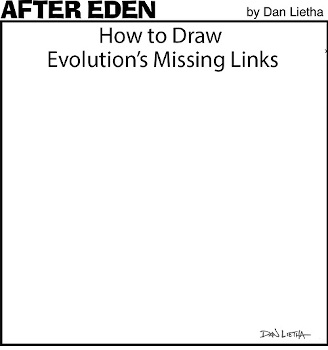


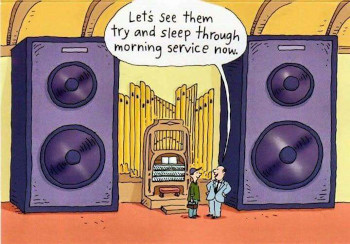


Frequently Asked Questions

Why Should We Accept Your Election When There Were Elections Prior to Yours?
On Wikipedia there are several links concerning the election of a Pope. It should first be remembered that Wikipedia can be edited by virtually anyone, unless they have made egregious changes and have been banned. So the information could come from anywhere. As this is being prepared, the Wikipedia page on Pope Michael is close to the truth, although there are minor inaccuracies and omissions.
Before looking at the claimants listed on the page on Conclavism, let us consider the work performed between 1987 and 1990 to determine and prove that the papacy was indeed vacant. This work can be found in the book, Will the Catholic Church Survive the Twentieth Century?
Clement XV (Michael Collin), who was in the same seminary that Archbishop Lefebvre was in and duly laicized in 1952 due to the apparitions he alleged to have received.
Gregory XVII (Gaston Tremblay), who split from Collin in 1968 because of his own alleged apparitions.
Gregory XVII (Clemente Gomez of Palmar de Troya, Spain) was also addressed. He claimed the papacy due to an apparition the day Paul VI died as his successor. He was a promoter of the imprisoned Paul VI. This theory was also held by others, the real Paul VI being unable to do anything and the imposter was father of the changes that came in the wake of Vatican II. He was ordained and consecrated by Bishop Peter Martin Ngo-Dihn Thuc. Emissaries from Palmar went to Archbishop Lefebvre, who sent them to Bishop Ngo-Dihn, because he (the Archbishop) was too busy to come.
Peter II (Julius Tishler) was also addressed.
We dismissed all of these claimants, because they were not elected, but all claimed heavenly appointment. On the Conclavist page these are mentioned under Mysticalists.
The proposition of Father Guerard des Lauriers that Montini, Luciani and Wojtyla were materially, but not formally Pope had also been addressed. This basically holds that upon their conversion, they would remove the obstacle to their accepting election. We proved that a heretic cannot have any claim to the papacy as set forward in the Bull, 'Cum ex apostolatus officio', which the Society of Saint Pius X says presents a teaching of the ordinary magisterium in an article, Clear ideas on the pope's infallible magisterium. A man either is, or he is not Pope.
The last thing addressed was the proposition that Joseph Cardinal Siri had been elected Pope in the 1963 and both 1978 Conclaves, but prevented from accepting election. He would be a Pope-elect. In fact, there was a five part series written in the late 1980's entitled: 'Exile of the Pope-Elect'. Based upon reasoning put forward earlier in the above named book, we had already proven that the 1963 conclave was so loaded with unqualified electors to make it questionable at best. Obviously by the same reasoning both 1978 conclaves would be invalid. Since Siri was at best a Pope-elect, any claim he had died with him on May 2nd, 1989.
Shortly before the 1990 election, the proposition changed to an election in 1958, that was accepted and then he was prevented from being proclaimed as Gregory XVII. They claimed secret Cardinals and were looking for them They stated that the Papacy was at that time (June 3rd 1990) vacant.
After Siri's death David Bawden wrote to the author of 'Exile of the Pope Elect', Gary Giuffre, which had only four installments published, to tell him that he was now in the same need of a Pope as the rest of us as Siri's claim had died with him. Giuffre never responded.
And so at the time of the election on July 16,1990, the Papacy was vacant.
Now the question arises about the four other elections listed on the Conclavism page. First, three can be immediately dismissed on the basis of first in time, first in right. This is most famously seen in the election of Pope Innocent II versus Antipope Anacletus II. Although only six Cardinals elected Innocent and a larger number later on Anacletus, Innocent is considered the true Pope and the successor of Anacletus resigned in favor of Innocent. This includes Victor Von Pentz (Linus II, 1994) and Earl Lucien Pulvermacher (Pius XIII 1998) Both groups of electors were fully aware of Pope Michael, but made no effort to address his claim to the Papacy. A key player, who was near all three elections, was Kenneth Mock, who never participated in an election, but was seriously involved before hand in all three cases.
As for the last group, little contact has been able to be made with that group and like Von Pentz, they have fallen into obscurity. Pulvermacher died leaving no successor.
Then the question arises of Pope Krav I (Mirko Fabris), who is alleged to have been elected in 1978. There is a one line reference to this person in 'Historical Dictionary of New Religious Movements'. As such, under Canon Law, this claim would not stand as there is one witness, and even this one is questionable. (The same is true of the claim that the Bishop who ordained and was principle consecrator of Archbishop Marcel Lefebvre was a Freemason. There is only one witness, which all others rely on, making this claim questionable.) There was no mention of such a person by anyone until the reference in the book mentioned above. It is the position of the Vatican in Exile, that this person is an internet fiction. There is a comedian known as Krav Mirko Frabris, although any connection to this spurious claim is unknown.
And therefore, David Bawden was elected Pope on July 16, 1990.
For answers to more frequently asked questions, click here: https://www.vaticaninexile.com/frequently_asked_questions.php
The Pope Speaks: September 2021
1950's Catholicism Led to 1960's Apostasy

If you look up articles on Pope Michael, they usually focus on Vatican II as the beginning of the apostasy from the Catholic Faith. However, lukewarmness and laxity had gotten into Catholics long before Vatican II. Saint Augustine said: "Heresies are only embraced by those who had they persevered in the faith, would be lost by the irregularity of their lives." The lives of Catholics, clergy and lay was for the most part irregular in the 1950's and before. In the main, most were only Catholics in name only. They were not men and women of prayer, as we are all called to be. They were living with one foot in the world and another in the Church. They had become what We call the Church comfortable. We study in the Catechism about the Church Militant on Earth, the Church Suffering in Purgatory, and the Church Triumphant in Heaven. However, many who claim the name of Catholic prefer to be the Church Comfortable, living just as little for God as they can in order to sneak in the back door of Purgatory. It is this attitude, which permeates many to this day, which led to Vatican II. One priest put it that the Catholic way of life in the 1950's had been reduced to Mass on Sunday, fish on Friday and five dollars in the collection plate. (The minimum wage in 1950 was seventy-five cents.)
Let us consider this quote from the 20th century: "How many there are, alas, not only among the young, but among adults and those advanced in years, who know nothing of the chief mysteries of faith; who on hearing the name of Christ can only ask? “Who is he. . . that I may believe in him?”[John 9:36] In consequence of this ignorance, they do not consider it a crime to excite and nourish hatred against their neighbor, to enter into most unjust contracts, to do business in dishonest fashion, to hold the funds of others at an exorbitant interest rate, and to commit other iniquities no less reprehensible. They are, moreover, ignorant of the law of Christ which not only condemns immoral actions but also forbids deliberate immoral thoughts and desires. Even when for some reason or other they avoid sensual pleasures, they nevertheless entertain evil thoughts without the least scruple, thereby multiplying their sins above the number of the hairs of the head. These persons are found, we deem it necessary to repeat, not merely among the poorer classes of the people or in sparsely settled districts, but also among those in the higher walks of life, even, indeed, among those puffed up with learning, who, relying upon a vain erudition, feel free to ridicule religion and to “deride whatever they do not know.”[Jude 10]" This was written over a century ago by Saint Pius X in his Encyclical on Catechism, an Encyclical that was ignored as were the instructions of Pope Pius XI on this matter later. Saint John Vianney said: "We shall find out at the day of judgment that the greater number of Christians who are lost were damned because they did not know their own religion."
Joseph Ratzinger, later Benedict XVI wrote: "For believers, it was a remarkable phenomenon that their bishops seemed to show a different face in Rome from the one they wore at home. Shepherds who had been considered strict conservatives suddenly appeared to be spokesmen for progressivism." 1 However, the seeds of this apostasy go far into the past. In the work Passion of the Mystical Body of Christ, We trace the seeds back to the Protestant Revolt.
More recently a shift can be seen in the middle of the nineteenth century around 1859. Some blame the infiltration of the Catholic Church by the Secret Societies. In 1859 The Permanent Instruction of the Alta Vendita was found and Pope Pius IX ordered it published. (It is reprinted in Key Documents to Understanding the Great Apostasy.) Pope Saint Pius X warned in the Encyclical, Pascendi: "That We make no delay in this matter is rendered necessary especially by the fact that the partisans of error are to be sought not only among the Church's open enemies; they lie hid, a thing to be deeply deplored and feared, in her very bosom and heart, and are the more mischievous, the less conspicuously they appear." More recently a book was translated into English and circulated, The Story of Seminary Student 1025. (This is in print as The Real Story of AA1025)
Infiltration of the Church is indeed a great evil, but these infiltrators would have been unable to plant the seeds that grew into Vatican II and its perfidious spirit, if it were not for lax Catholics. Several saints have remarked that their only fear were lax Catholics. Lax Catholics are fertile soil for the seeds of error.
The Devil told Saint John Vianney, if there had been three priests like him, the devil would be out of business. The laxity began with the clergy. By the Twentieth Century, especially in the United States, the priesthood had become a career rather than a way of life.
The seeds of apostasy were planted in the 19th Century and began to grow. Pope Leo XIII wrote against liberalism and Saint Pius X wrote against Modernism. Unfortunately these forms of apostasy grew until they took hold of the Bishops who came to Vatican II.
The seeds of Religious Liberty, which Pope Pius IX condemned, took root and flourished. Father Nicholas Walsh wrote a book, The Comparative Number of the Saved and Lost, at the end of the 19th century. In this book he argued that not only are the majority of Catholics saved, but the majority of people are saved. The Saints are not of this opinion.
It is Our opinion that Vatican II was actually the end, which had been sought for centuries by the enemies of Jesus Christ. Two sects grew from Vatican II. The first is the Conciliar Church, which also could be referred to as the Roman Catholic Church. Recall that the only real Vatican Council (1869-1870) decided not to call the Church Roman Catholic, as this implicitly implies there are other kinds of Catholics, when there are not. It does not matter what the sign says out front. What matters is what Faith is taught inside and visible unity with the Vicar of Jesus Christ, the Pope.
The second sects, which is divided into many parts, was formed as a reaction to Vatican II, the Traditionalists. There are many who claim the title of Traditionalist, but in actual fact are not truly holding to the Traditions of the Catholic Church. Some of the teachings they hold are contrary to the Faith. First of all, the hold that priests and bishops are mere ministers of the Sacraments, when the Office of the Priesthood is far more than a ministry of the Sacraments. Of course, none of the Traditionalists with one or two exceptions claim the Office of the Priesthood or the Office of Bishop. In the latter case, claiming the Office of Bishop would bring them under the excommunication instituted by Pope Pius XII.
Saint Paul warned: "For the mystery of iniquity already worketh; only that he who now holdeth, do hold, until he be taken out of the way." (2 Thessalonians 2:7) If the mystery iniquity was already at work just after the time of Jesus Christ, then it was working towards Vatican II. What happened with the death of Pope Pius XII was the removal of the withholding force, which was replaced by Antipope John XXIII-II, who reigned unopposed by a true Pope. He called Vatican II, which promulgated the new doctrines of the Conciliar Church under Antipope Paul VI. These doctrines were already held by many, who claimed the name of Catholic illegitimately. (Apocalypse 3:9)
Many want to return to 1950’s Catholicism, when we need to move forward to a true 21st century Catholicism. We need to move forward to stronger Faith and practice of that Faith. We need to live by the Gospels, not just read them.
1 Milestones, page 132


Saint Mark the Ascetic
On The Spiritual Law

142. Do not say: 'I don't want it, but it happens.' For even though you may not want the thing itself, yet you welcome what causes it.
143. He who seeks praise is involved in passion; he who laments afflictions is attached to sensual pleasure.
144. The thoughts of a self-indulgent man vacillate, as though on scales; sometimes he laments and weeps for his sins, and sometimes he fights and contradicts his neighbor, justifying his own sensual pleasures.
145. He who tests all things and 'holds fast that which is good' (1 Thess. 5: 21) will in consequence refrain from all evil.
146. 'A patient man abounds in understanding' (Prov. 14: 29); and so does he who listens to words of wisdom.
147. Without remembrance of God, there can be no true knowledge but only that which is false.
148. Deeper spiritual knowledge helps the hard-hearted man: for unless he has fear, he refuses to accept the labor of repentance.
149. Unquestioning acceptance of tradition is helpful for a gentle person, for then he will not try God's patience or often fall into sin.
150. Do not rebuke a forceful man for arrogance, but point out to him the danger of dishonor; if he has any sense he will accept this kind of rebuke.
Saints from East and West
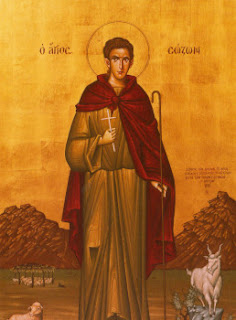
7 September - Saint Sozon.
The Martyr Sozon, a native of Licaonea, was a shepherd.
He read the Holy Scriptures attentively, and he loved to share his knowledge about the One God with the shepherds who gathered together with him. He brought many to the faith in Christ and to Baptism.
By night-time once, when he sat under an oak tree, he had a vision foretelling his deed of martyrdom for Christ.
He set off to the city of Cilician Pompeiopolis, where a festal pagan celebration was being prepared for a golden idol, standing in a pagan temple. Unseen by anyone, saint Sozon went into the pagan temple and broke off the hand of the idol, and having smashed it he gave the gold to the poor.
The missing hands of the idol caused an uproar and commotion in the city: many were under suspicion, given over to interrogation and torture. Not wanting to be the cause of suffering for other people, Saint Sozon went to the emperor Maximian (284-305) and declared that it was he that broke the hand from the idol. "I did this," he said, "so that ye might see the lack of power of your god, which offered me no resistance. It is not a god, but rather a deaf and dumb idol. I wanted to smash it all into pieces, so that people would no longer worship its wrought hands."
The emperor in a fitful rage commanded that Saint Sozon be tortured mercilessly. They hung him up and struck at him with iron claws, and then they put on his legs iron shackles with nails inside and took him through the city. After this they again suspended him and beat him with iron rods until his bones broke.
In these terrible torments Saint Sozon gave up his spirit to God (+c.304). By decree of the emperor, slaves set a strong fire so as to burn the body of the martyr, but suddenly lightning flashed, it thundered loudly and a strong rain poured down over the flames of the fire. Christians took the body of the martyr by night and gave it over to burial. By his grave and at the place where he had the vision, there occurred healing of many of the sick. A church later was built in memory of the sufferings of the holy martyr.
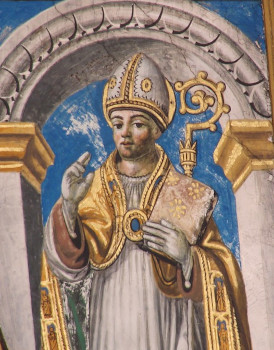
10 September - Saint Salvius of Albi.
Saint Salvius (or Salvy) belonged to a family of Albi in France, and was at first a lawyer and magistrate; but his love for retirement and the desire of being freed from distractions induced him to become a monk, and his brethren afterwards chose him for their abbot.
He chiefly confined himself to a cell at a distance from the rest, and here, being seized by a violent fever, he grew so ill that he was dead in the opinion of all about him. Indeed the saint himself was always persuaded that he really died, was vouchsafed an experience of Heaven before due time, and then was restored to life.
Be that as it may, he was in the year 574 taken from his retreat and placed in the see of Albi. He lived as austerely as ever; if anything were forced upon him, he on the spot distributed the whole among the poor.
The patrician Mommolus having taken a great number of prisoners at Albi, Salvius followed him and ransomed them all. The king of Soissons, Chilperic, fancied himself as a theologian and was responsible for an unorthodox treatise; Salvius, together with his friend St Gregory of Tours, succeeded in bringing the monarch back to orthodoxy.
In the year 584 an epidemic made great havoc among his flock. It was in vain his friends advised him to be careful of his health; animated, unwearied, undaunted, he went everywhere he thought his presence necessary. He visited the sick, comforted them, and exhorted them to prepare for eternity by such good works as their condition admitted. When he knew that his own hour was near, he ordered his coffin to be made, changed his clothes, and prepared himself to appear before God, to Whom he was called on September 10, 584.

Advice You Can Bank On
A Catholic Perspective On Finances

Are there consequences for borrowing money?
The Dangers of Going Into Debt - scriptural warnings about borrowing money
Scripture’s message on borrowing money is quite clear: Do not do it. God calls Christians to keep out of debt altogether. “Owe no man any thing, but to love one another . . .” (Romans 13:8).
Borrowing constitutes a judgment of God.
In the Old Testament, borrowing was evidence that the people of Israel were facing God’s judgment. “But if thou wilt not hear the voice of the Lord thy God, to keep and to do all his commandments and ceremonies, which I command thee this day, all these curses shall come upon thee, and overtake thee. . . . . He shall lend to thee, and thou shalt not lend to him. He shall be as the head, and thou shalt be the tail.” (Deuteronomy 28:15, 44).
Borrowing results in bondage to creditors.
The very nature of going into debt is entanglement. Hebrew words for borrow mean “to twine . . . to unite . . . to borrow (as a form of obligation)” (lâvâh), and figuratively “to entangle” (âbat). Scripture warns, “ . . . The borrower is servant to the lender” (Proverbs 22:7).
God intends for Christians to avoid earthly entanglements in order to serve Him freely, without reservation and without distraction. “No man, being a soldier to God, entangleth himself with secular businesses; that he may please him to whom he hath engaged himself. ” (II Timothy 2:4).
Borrowing presumes upon the future.
Borrowing is based on the assumption that future conditions will allow us to repay the debt. God warns against such presumption: “Boast not for to morrow, for thou knowest not what the day to come may bring forth.” (Proverbs 27:1). “But who art thou that judgest thy neighbour? Behold, now you that say: To day or to morrow we will go into such a city, and there we will spend a year, and will traffic, and make our gain. Whereas you know not what shall be on the morrow. . . .” (James 4:13–14).
Borrowing creates an illusion of independence.
Borrowing money allows us to make decisions that are independent of God’s provision of funds. Borrowing may encourage an individual to feel that he is his own authority and that he does not need to wait for wise counsel or sufficient funds. Such an attitude is condemned by God.
“Who is he that hath commanded a thing to be done, when the Lord commandeth it not? ” (Lamentations 3:37). “. . . For what is your life? It is a vapour which appeareth for a little while, and afterwards shall vanish away. For that you should say: If the Lord will, and if we shall live, we will do this or that. But now you rejoice in your arrogancies. All such rejoicing is wicked. To him therefore who knoweth to do good, and doth it not, to him it is sin.” (James 4:15–17).
Borrowing evades self-examination.
God always has a good reason for withholding funds. It is a signal to reevaluate our decisions and to put our faith in Him. If we automatically borrow money when there is a financial need, we evade the opportunity for self-examination and often proceed depending on our own wisdom and efforts.
Borrowing pressures family members.
Borrowing puts pressure on those who depend on our leadership and provision, especially family members. Unexpected events can transfer the burden of debt directly to them.
The anguish of this situation is illustrated in the plight of a widow who lived during the time of Israel’s prophet, Elisha. The widow’s husband had been deeply in debt. When he died, his creditors demanded payment from his wife. She forfeited everything she had, but the proceeds were not sufficient to pay off the debt, and her creditors demanded that her sons become their bondservants. The woman sought counsel from Elisha, and God moved supernaturally to provide for the payment of her debt. (See II Kings 4:1–7.)
Borrowing interferes with God’s provision.
God wants to demonstrate His supernatural power as He provides for our needs. In this way, He exposes the false confidence people place in their own wisdom, abilities, and riches. “For the eyes of the Lord behold all the earth, and give strength to those who with a perfect heart trust in him. . . .” (II Chronicles 16:9).
Borrowing demonstrates discontentment with necessities.
We need only a few basic things to survive: food, clothing, and shelter. Yet, most of us have expectations of additional provisions, and often borrowing is regarded as a means to purchase items that are not necessities. God warns us of the danger of coveting the power to buy whatever our hearts desire.
“Godliness with contentment is great gain. For we brought nothing into this world: and certainly we can carry nothing out. But having food, and wherewith to be covered, with these we are content. For they that will become rich, fall into temptation, and into the snare of the devil, and into many unprofitable and hurtful desires, which drown men into destruction and perdition. For the desire of money is the root of all evils; which some coveting have erred from the faith, and have entangled themselves in many sorrows.” (I Timothy 6:6–10).
Borrowing removes barriers to harmful items.
There are many things we think would be beneficial to our lives, but God knows if they would be harmful to us or not. In His mercy and wisdom, He may limit our funds so that we cannot afford to purchase things that would be harmful or destructive. When God does not provide funds for something we want, Satan tempts us to get the money in other ways.
Borrowing devours resources through high interest payments.
Most people who borrow money do not comprehend the final price tag of going into debt, because they think only in terms of monthly payments. They typically think of the interest as a small amount, but in the end, interest payments pile up. The final cost of the loan is often several times greater than the initial price of the item.
God calls us to be good stewards of money and to be faithful in managing small amounts as well as large amounts. “He that is faithful in that which is least, is faithful also in that which is greater: and he that is unjust in that which is little, is unjust also in that which is greater. If then you have not been faithful in the unjust mammon; who will trust you with that which is the true? ?” (Luke 16:10–11).
Borrowing stifles resourcefulness.
Having loans available on demand tempts us to reject the option of thinking of creative solutions to meet financial needs. Only when you make a firm and final decision that you will not borrow money are you mentally, emotionally, and spiritually free to be truly resourceful.
Jesus gave two illustrations of men who wanted to buy expensive items. Although neither man had enough money to make the purchases, neither man borrowed any money. Instead, the men sold what they had. With the money from the sale, they bought what they wanted. (See Matthew 13:44–46.)
Borrowing promotes impulse buying.
Buyers are often encouraged to make impulsive decisions based on the desires of the moment. Easy access to loans facilitates hurried purchases that bypass prayerful evaluation and wise counsel. We should carefully consider our management of the funds God provides and wait until we know we are finding a good buy before making a purchase.
Borrowing often instigates overspending.
Credit card users tend to buy more than those who pay with cash, and they tend to pay more for the items they buy. Overspending is destructive because of the bondage debt brings. Overspending also stimulates pressures and conflicts that damage relationships, especially within the family.
Borrowing weakens personal faith.
God has promised to provide for the needs of His children. (See Matthew 6:25–34.) When Christians borrow, it suggests that God is not taking care of their needs and that they have to make up the difference with a loan. If we do not have money for something, it may be that God is saying “wait” or “no.” It is far better to wait for God to provide rather than to borrow money to make the purchase. God’s provision confirms His direction for us and demonstrates His faithfulness to us.
Borrowing excludes help from others.
God uses the needs in the life of one Christian and the abundance in the life of another Christian to bring them together in fellowship. The one with abundance is given grace to help those in need, and the one who receives is filled with joy and gratefulness because of God’s provision through the giver.
Interdependence played a key role in the early Church. “In this present time let your abundance supply their want, that their abundance also may supply your want, that there may be an equality, As it is written: He that had much, had nothing over; and he that had little, had no want.” (II Corinthians 8:14–15).

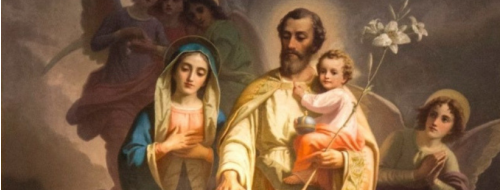 Family Matters
Family Matters
Revelations of Reality
Years ago I was sitting in the home of a dear couple who had one little boy about three years old. They had invited me to their home so they could ask me a few questions about the training of their son. While we were sitting there making small talk, this little boy was all over the place. Some would say he was hyperactive. The dear mother would stop every few moments and try to get him to do better. You know how that is. “You have to behave now. Fr.---- is here.”
Finally, the mother and the father broke down in frustration and said, “What do we do with our little boy? He is like this most of the time, and we are at our wits' end.”
Well, I had already been studying the little fellow, and was praying about what I should say to them. God must have given me a word of wisdom, because I did not know what to ask them. I said to the mother, “How did you feel about your son when you were carrying him in the womb, and when he was born?” She looked at me with a stunned look on her face and said, “How did you know to ask that question?” Then she began to cry.
Well it all came out. She was a spoiled child, and when she found out that they were going to have a baby, in selfishness, she hated the child in her womb. All she could think of were the hardships that accompany the birth and growth of a child.
God changed a mother's heart that day through repentance, and the dear little boy's behavior started to change immediately. It is easy to see how this mother's view of the child was affecting her ability to train him. It was also affecting his response to his mother. The silent message was coming through loud and clear. His selfish heart was saying, “You will give me attention, even if I have to bounce off the walls to get it.” I tremble to think what might have happened to this child if his mother had not found a place of clearing. Theses attitudes create confusion in the heart of a child. For some, theses attitudes affect them way into their adult lives.


Books to feed your faith!
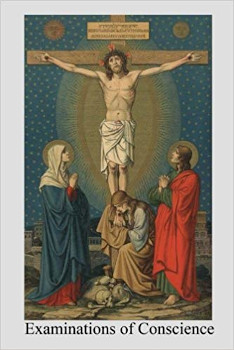
Examinations of Conscience
$14.95
This work contains several examinations of conscience from Catholic classic books. It also contains Saint Alphonsus' instruction on Confession from his Catechism. Further notes are contained on modern sins and on conversion. One examination of conscience distinguishes between mortal and venial sins. In preparing for the Sacrament of Confession it is easy to get into a rut, using the same examination of conscience for every Confession. These examinations are from various sources and are provided to help us shake up our spiritual life. By varying our routine, we can more easily identify our sins and bring them to the tribunal of Penance where we can present them before the Divine Physician and His human representative, the duly authorized priest. In this way our confessor can prescribe the remedies for our sins, so that we can heed the advice of Jesus: “Go now and sin no more, lest some worse thing happen to you.” (John 5:14) Since these come from timeless older works, they have been updated by this author to include the sins that are so easily committed with modern technology, such as radio, television, moves, the computer and the internet. We hope all will benefit from the sage advice contained in this book.

Spiritual Despondency and Temptations
$15.95
In this book you will therefore find wholesome instruction, great knowledge of the interior life, and of the human heart, - the result of years of experience in the direction of souls. The subject is at once both highly important and very difficult. The Author has not confined himself to general principles and vague maxims, but he has entered into the very sanctuary of the soul, into its secret folds and most intricate windings. The thread of Reason, the light of Faith, and the torch of Experience have led him safely through that labyrinth where so many lose themselves, rashly attempting to explore it without the proper guides. A few principles, presented under different aspects, solve all difficulties, throw light upon doubts that are ever recurring, expose all the subterfuges of self-love, sloth, and cowardice, refute their objections, and silence their excuses. The Author has followed the most useful plan for works of this kind. He adopts the method of reasoning - and his reasoning is as clear as it is solid. The greater number of persons who profess piety prefer appeals to their imagination and to their heart, rather than to their reason. They like to be excited by lively descriptions, and by tender and touching language; but in so doing, they are seeking a passing gratification rather than a real and permanent benefit. Such descriptions and sentiments soon fade away, but the fruits of conviction are more lasting. Pure reason and true faith never vary; imagination and feeling are incessantly changing according to the different objects which act upon them. It is from indolence that feeling is preferred to reasoning. The greater part of mankind are indolent, and hence there are so few who care to reflect and reason. But one who has an earnest love for virtue and duty, who is anxious about his salvation, should not shrink from the mental effort which the exercise of reason and of faith requires. We should remember that no sincere and permanent resolution can be taken without a conviction of its necessity. This is according to the natural order of reason, and to the economy of grace. The understanding must be enlightened before the will can be moved. This work appears to be specially intended for the instruction of persons living in religious communities, and for seculars aiming at perfection; but in this age of indifference and discouragement all who profess the true faith may here find no little help to undeceive them in their errors, and to strengthen them against the wiles of self-love. We venture to hope that even Directors of consciences may discover therein that which will increase their light, and supply for any want of experience in their difficult and dangerous ministry.
Will the Real Catholic Church Stand Up?
Kindle $2.99 / Paperback $9.95
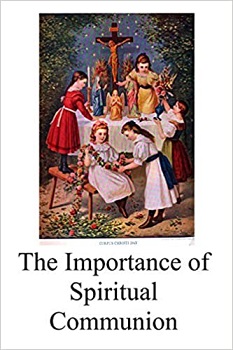
The Importance of Spiritual Communion
Kindle $2.99 / Paperback $5.99
If we cannot receive Holy Communion actually, then let us do so spiritually. These prayers and instructions have been gathered from the Saints and other venerated spiritual writers. Spiritual Communion has been a part of the spiritual life for decades. Growing up I was instructed to make a Spiritual Communion, when I could not go to Communion such as when I assisted at a second Mass. The same is true if one finds oneself at Mass, but not fasting. There are times coming, when it will be difficult, if not impossible to assist at the Holy Sacrifice of the Mass. We should be prepared for such times.
For More Good Traditional Catholic Books:

Mella Knope's Zucchini Cornbread Casserole

The old favorite!
Ingredients
4 cups shredded zucchini
1 onion, chopped
2 eggs, beaten
1 (8.5 ounce) package dry corn muffin mix
½ teaspoon salt
¼ teaspoon ground black pepper
8 ounces Cheddar cheese, shredded
Directions
1. Preheat oven to 350 degrees F (175 degrees C). Grease a 2 quart casserole dish.
2. In a large bowl mix together the zucchini, onion, eggs, muffin mix, salt and pepper. Stir in 4 ounces of the cheese. Spread this mixture into a greased 2 quart casserole dish; top with remaining 4 ounces of cheese.
3. Bake in a preheated oven for 60 minutes.
Zelba Phipps' Super Simple Applesauce

This applesauce is simplicity itself but so delicious! Great for a good apple harvest.
Ingredients
4 apples - peeled, cored and chopped
¾ cup water
¼ cup white sugar
½ teaspoon ground cinnamon
Directions
1. In a saucepan, combine apples, water, sugar, and cinnamon.
2. Cover, and cook over medium heat for 15 to 20 minutes, or until apples are soft.
3. Allow to cool, then mash with a fork or potato masher.
Video sermons and instructions: Timeless timely truths for living the Faith
15th Sunday after Pentecost - 2011
Birthday of the Blessed Virgin Mary
Getting the Gospel Right
Ep 6 The Cost of Being A Disciple Of Christ

Encouragement for Today
Therefore encourage one another and build one another up.... I Thessalonians 5:11
We believe that through our assorted podcasts, Vlogs, audio downloads and devotional blogs, you will find an assorted Treasure Chest of...
- Sermons
- Classic Catholic Audio Books.
- Devotionals
- Scripture Studies
- Catechism Lessons
- Old-Time Christian radio programs
- Catholic Videos
...that will be a help in your faithful walk with the Lord.
LEARN MORE AT THE ENCOURAGEMENT FOR TODAY WEBSITE: https://www.encouragementfortoday.com
MYSTERIES OF ULURU
"And the waters prevailed beyond measure upon the earth: and all the high mountains under the whole heaven were covered. The water was fifteen cubits higher than the mountains which it covered." Genesis 7:19-20

Have you ever had the privilege of visiting Australia – that vast continental nation, covering a similar land area to the lower 48 states? If you ever manage to get there, You should see the famous landmark which used to be known as Ayer’s Rock but is now more usually known by its name in the tongue of the native Ananga people – Uluru. This impressive piece of sandstone rises from the desert of the south of Australia’s Northern Territory, situated 208 miles southwest of Alice Springs. Like an iceberg, even more of this unusual monument lies below ground.
Uluru is made of a coarse type of sandstone known as arkose, comprised of angular grains of pink feldspar. The rock layers are arranged steeply, at about 80° to the horizontal. Evolutionists assume that this stone was formed in a shallow sea over a period of about 350 million years. Then, about 550 million years ago, it was uplifted and folded.
This view is problematic, as the angular feldspar grains are characteristic, even on an evolutionary timescale, of much younger rock. Over time, the feldspar grains should decompose and form clay. As we are used to, the formation of Uluru is better explained by one catastrophic event – the biblical Flood. Deposition under massive flood conditions, followed quickly by uplift and folding later in the Flood, is a better explanation of how the angular feldspar grains have survived. Uluru is another witness of the truth of God’s word.
Prayer: We look at Your wonderful world, Lord, and in every corner, we see evidence consistent with Your word being true – and we praise You. Amen.
Catechism Catch-Up
Give Us This Day Our Daily Bread
A brief glance at the Lord’s Prayer reveals that there is one word that characterizes the first half of the prayer and another word that characterizes the second half of the prayer. The word for the first half is “your"-Your name, Your kingdom, Your will. The word for the second half of the prayer is “us"-Give us, forgive us, lead us. By arranging things this way Jesus is teaching us that we are to begin with God’s concerns. We are to pray to God about the things he is most concerned about. When we have done that, we are to pray for our own concerns-Our daily bread, our forgiveness, and our protection in the moment of temptation. We start in heaven and then come down to earth, which is the pattern of all divine revelation.
In the second half of this prayer God is brought directly into the very tiniest details of our everyday lives.
Let’s take a look at the second half of the prayer and analyze it a little bit more. It contains three petitions- “Our daily bread”, “forgive us our debts”, and “lead us not into temptation.” That covers provision, pardon and protection. If you think about those three things, they take care of all the needs of life Not only that, it takes care of every part of you personally. Provision takes care of your body. Pardon takes care of your soul. Protection takes care of your spirit.
The second half of the Lords prayer begins with a petition for provision: “Give us this day our daily bread.” There are two words we need to think about before we consider the deeper meaning of this petition. First, this is a prayer for bread, not for cake. “Give us today our daily bread.” The Greek word for “bread” refers to common, ordinary bread. It doesn’t mean anything fancy. It just means normal, everyday bread. Jesus is telling us that when we pray, we ought to pray for ordinary, normal, everyday bread.
This is a prayer for food. When was the last time you actually prayed to God, “O God, please give me a meal?” Most of us ought to pray the opposite, “O God, prevent me from eating another meal, I have already eaten too much.” This petition sounds like it ought to be a prayer uttered by someone living in Haiti or Bangladesh. It’s sad but true. We have so much food we take this prayer request for granted.
In the broader spectrum, it also includes clothing and shelter. St. Augustine points out, "we ask for these temporal things not as our goods but as our necessities". We should not be seeking luxuries. Rather, "having food and wherewith to be covered, with these we are content" (1 Timothy 6:8). As Solomon wisely prayed: "Give me only the necessaries of life" (Proverbs 30:8)
But the bread mentioned in this prayer means more than just physical bread or physical necessities; it’s also a reference to our spiritual bread-the bread of life!. Luke when, speaking of the Lords prayer, says “our daily (Latin: quotidianum) bread”, which means “the bread of our necessity” or “the bread that suffices for each day”. But in Matthew the same Greek word is translated “supersubstantial (Latin: supersubstantialem) bread” which means more than substantial; being more than substance.
This petition,... also applies to another hunger from which men are perishing: 'Man does not live by bread alone, but ... by every word that proceeds from the mouth of God' (Deuteronomy 8:3; Matthew 4:4), that is, by the Word He speaks and the Spirit He breathes forth. There is a famine on earth, not a famine of bread, nor a thirst for water, but of hearing the words of the Lord (Amos 8:11). For this reason the specifically Christian sense of this fourth petition concerns the Bread of Life, the Word of God accepted in faith, the Body of Christ received in the Eucharist.
Jesus compares the gift of faith to bread. After the multiplication of the loaves, Jesus told the crowd: "Do not labor for food that perishes, but for that which endures unto life everlasting, which the Son of Man will give you. ... My Father gives you the true bread from heaven. For the bread of God is that which comes down from heaven and gives life to the world. ... This is the labor of God that you believe in Him and in Him Whom He has sent" (John 6:27).
The crowd understands that Jesus is demanding faith, but they demand the labor of bread for their bellies. Jesus responded: "I am the bread of life. He who comes to Me shall not hunger, and he who believes in Me shall never thirst. ... whoever beholds the Son, and believes in Him, shall have everlasting life, and I will raise him up on the last day" (John 6:27,32,34,40).
Therefore, we may conclude that Jesus, as the object of our Faith, is our daily bread for which we pray.
Jesus is more than our bread of faith; He is our Eucharistic bread. Only after they first believe in Him can they believe in His presence in the Eucharist: "I am the bread of life. Your fathers ate the manna in the desert, and have died. This is the bread that comes down from heaven, so that if anyone eats of it, he will not die. ... If anyone eats of this bread he shall live forever; and the bread that I will give is My flesh for the life of the world" (John 6:48-51).
Many disciples grumbled at this, "How can this man give us His flesh to eat?" Note how Jesus confirms that they have understood Him properly, declaring solemnly, "Amen, amen I say to you, unless you eat the flesh of the Son of Man and drink of His blood, you shall not have life in you. He who eats My flesh and drinks My blood has life everlasting and I will raise him up on the last day" (John 6:52-54).
This great petition “Give us today our daily bread” is more than just a prayer request. Properly understood, it describes an entire way of looking at life. This petition suggests something about a truly Christian lifestyle. You could call it Daily Bread Living. That is to say, if you are going to pray this prayer with understanding, it’s going to lead to a certain attitude, or a certain way of life. If this prayer is ever going to become reality it must first affect the way you live. Therefore I want to suggest four steps to Daily Bread Living. Each step comes from the very words of the text itself. These four steps to daily bread living are really four qualities that need to be in your life if this prayer request is ever going to become a reality.
1.The First Step to Daily Bread Living is Gratitude to God for All His Blessings.
The first step comes from the very first word. “Give us today our daily bread." This prayer request teaches us that everything we have comes from God. Everything. The clothes, the food, the friendships, the education, the mind we use, the words we speak, everything comes from God. We are put in the position of those who are praying, “O heavenly Father, give us what we need.” Surely this must be the central teaching-that gratitude to God is to mark our lives and we’re to be grateful to God for all he’s done.
2. The Second Step to Daily Bread Living is Contentment with What God has Already Provided.
The key to the second step is in the very last word: “Give us today our daily bread." We are invited to ask for bread, not for cake. We are to pray “give us today our daily bread,” not “our daily dessert.” Jesus encourages us to pray to God for our needs, not for our greed's. We are to pray and ask God for what we really need, not for every wild desire that comes into our mind. The text says “bread,” not “chocolate eclair.” We are to trust God for the things we really need.
3. The Third Step to Daily Bread Living is Confidence That God Will Meet My Needs Day by Day.
“Give us this day our daily bread.” Daily bread living means believing that God will provide what you need on a day by day basis. God is willing to supply our needs, but only on a day to day-to-day basis. We don’t like to live like that. Most of us have freezers at home filled with food. Maybe we have a side of beef and some vegetables. We have plenty of food. A freezer filled with food makes it more challenging to pray this prayer sincerely. We mutter our prayers instead of saying them from the heart because we already know we aren’t going to go hungry. Maybe we should be considering giving some of that food, that is in the freezer, to those who have a daily need. You may be the answer to someone's prayer-”give us this day our daily bread”
We don’t like to live the way Jesus is talking about here. We don’t want to live day to day. We’d rather have pension plans and stocks and bonds and options. We would rather have life insurance policies that guarantee a secure future. If we had our way, this prayer would read, “Give us this week our weekly bread.” Or “Give us this month our monthly bread.” Or better yet, “Lord, give us this year our yearly bread. Just give it to us all at once and we’ll be all right. Then we’ll trust you."
God does not work that way. He works by teaching his people moment by moment dependence upon him.
4. The Fourth Step to Daily Bread Living is Generosity Toward Those who are Less Fortunate.
This principle comes from the little word “our” - “Give us this day our daily bread.” It does not say, “Give me my daily bread. That’s a completely different prayer. You’re never invited to pray for yourself alone. Every time you pray this prayer you are invited and encouraged and even commanded to pray in concert with your brothers and sisters. We all eat from the same table. This petition imparts a bigness, a vastness, a broadness to your prayers. It takes you out of the narrow focus of your own problems and it opens you up to a whole world of people all around you. This thought runs against the grain of modern society. In the marketplace only the tough survive. You’ve got to look out for yourself and make sure no one is gaining on you. It’s a dog-eat-dog world out there. Whoever works the hardest gets the most. The world says, “Get to the top any way you can.” How different that is from the words of Jesus in Luke 6:38, “Give and it shall be given to you.” It is a jungle out there and the business world runs by the law of the jungle. Only the tough survive. You’ve got to look out for “number one.” It is open warfare and you have to be willing to stick someone hard if that’s what it takes to get to the top. It’s totally opposite of what Jesus is suggesting here.
So what is daily bread living? Let me summarize. Daily bread living is:
1. Gratitude to God for all of his blessings.
2. Contentment with what God has already given you.
3. Confidence that God will meet your needs day by day by day.
4. Generosity toward those who are less fortunate than you.
Gratitude. Contentment. Confidence. Generosity. That’s what Daily Bread Living is all about. If you pray this prayer enough, that’s where you’ll end up. It’s not a bad place to be.
READ MORE FROM THE TRADITIONAL CATECHISM AT THE WEBSITE: https://www.traditionalcatechism.com
Living Catholic:
Evidences Of An Angry Spirit

A person who has a spirit of anger usually demonstrates one or more of the following characteristics.
1. Justification of a “little bit” of anger
One of the chief factors contributing to a spirit of anger is the idea that a little anger is acceptable. It is true that the initial emotion of anger is not sin, yet we are not to harbor it. Allowing a little anger to continue is like letting a little fire burn in a dry forest.
Anger alerts us to the fact that something is wrong and that we must cautiously respond to a situation that could lead us into wrath or bitterness. Anger may reveal that there are past hurts or feelings of guilt that need to be addressed before we can thoroughly resolve the feelings of anger.
2. Belief that anger can be controlled
Just as people think that a little anger is okay, they also think anger can be controlled. The problem with this idea is that when anger is not recognized and properly resolved, it quickly turns into wrath, bitterness, malice, or other sinful emotions.
When people speak of controlling anger, they often actually mean they think they can contain the damage of unresolved anger. However, one angry response produces different levels of pain among those who are hurt by it. Also, a spirit of anger is contagious—those who are around angry people can easily develop a spirit of anger and consequently damage others. Thus, the destruction caused by one angry act is difficult to measure, and it is impossible to control.
3. Insensitivities to the hurts caused by anger
Many people do not realize how deeply their anger affects others. They gloss over outbursts of anger and fail to ask for forgiveness and restore relationships marred by conflict. Sometimes this insensitivity stems from the fact that we can’t hear our own voices or see our facial expressions. If we could witness our angry actions and gauge the mental and emotional responses of others, we might realize how damaging angry behavior truly is.
4. Pride and domination
The contention that comes from a spirit of anger is a clear indication of pride, because “Among the proud there are always contentions” (Proverbs 13:10). Outbursts of wrath, bitterness, or malice give a person a sense of power and authority with which they attempt to control others. The ultimate expression of pride is seeing ourselves as being on the same level as God, which we do when we become wrathful, because only God has the right to express wrath.
5. Indulgence in passions
The indulgence of passions in one area leads to the indulgence of passions in other areas. Thus, there is a close tie between unresolved anger and lust. It is common for one who is defeated in the area of unresolved anger also to be defeated by moral impurity.
6. Quickness to take up offenses
The bitterness caused by taking up an offense for another person is typically the most difficult type of bitterness to overcome, because we are not directly involved in the situation. Often those in the peripheral sphere of family and friends do not fully understand the situation or witness the forgiveness and reconciliation that may take place. In many instances, long after the offended and the offender have cleared up their differences, the one who has taken up the offense is still angry about what happened.
7. A family history of angry people
Parents who demonstrate anger can pass on behavioral patterns to their children in the same way they pass on physical characteristics. When a wrathful person is asked whether his father or grandfather had a problem with anger, the response is almost always a passionate “Yes!”
8. Argumentation
Heated debates can be an indication of someone’s desire to dominate other people. An angry person will often argue, not to arrive at truth, but merely to defeat the reasoning of his opponent. We find many warnings in Scripture against arguing, because it is a fruitless exercise and leads to further strife. “And avoid foolish and unlearned questions, knowing that they beget strifes. But the servant of the Lord must not wrangle: but be mild towards all men, apt to teach, patient, With modesty admonishing them that resist the truth: if peradventure God may give them repentance to know the truth,” (II Timothy 2:23–25).
9. Unable to give or receive forgiveness
An angry person usually expresses bitterness about life in general; ultimately he is expressing bitterness toward God. His hurts from the past are usually associated with many people or groups of people, and therefore it is hard for him to forgive a single individual or respond well if one asks him for forgiveness. He typically balances his guilt by blaming others for his problems. He withholds forgiveness so that he is not left with only his guilt and the responsibility of his actions.
10. Harsh on the outside, sensitive on the inside
Often the pain that fosters a spirit of anger comes from the rejection of a parent or another influential person. Anger then becomes a shield that an individual hopes will protect him from the pain of further rejection, yet the person still has an intense longing for acceptance and approval. When he begins to sense disapproval from someone, he tends to quickly reject that person out of fear of being rejected.
To Learn More Principles For Life Go To: Resources: Principles of Life


Pray for the Holy Father! Pray with the Holy Father!
- Your prayers are asked this month and every month for the intentions of the Holy Father, Pope Michael.
- Pray for the Holy Father in the preparation for the tenth anniversary of His Holiness' Coronation on Friday, December 10, 2021.
- Please pray for the success and growth of the new Chrysostom Bible Institute. Check out the wonderful work it is doing and see how you can get involved!
- Your prayers and support are asked in a special way for the soon to be established House of Prayer.
- Pray especially that the Holy Ghost inspires and helps us prepare spiritual manuals and days of recollection to make available to all.
- Keep in your prayers our Podcast Ministry, a new way to reach out in the missionary work of the Church! We ask for prayers for our other activities world wide. We have made good contacts in the Philippines and Japan and ask prayers that these contacts will bear much fruit for the salvation of souls.
- Be sure to keep St. Helen Catholic Mission in your prayers. Why not go on over to the site now and see what they have to offer and how you might be able to help!
- Also we ask you to keep in prayer our increasing missionary work in the United States and elsewhere.
- Pray for those outside the Church and those who do not know God, that they may see the light of grace and be led safely home to the refuge of the Holy Catholic Church.
- As always, we also ask that you pray for yourself! Never forget your own state of soul. God is calling you to His service in His love. We know that our Lord can count on you to answer.
- We are all praying especially for you, too. May you correspond with every grace of God!
- In what other needs or intentions may we pray for you? Let us know!
- Let us remember that the Church runs on prayer. Without your prayers, God will not work in hearts and souls to bring them to a knowledge of the truth. (I Timothy 2:4)


To Donate online go to:

To Donate by Mail:
Our address is
Vatican in Exile
829 NE Chester
Topeka, Kansas 66616
Make Checks payable to:
Vatican in Exile


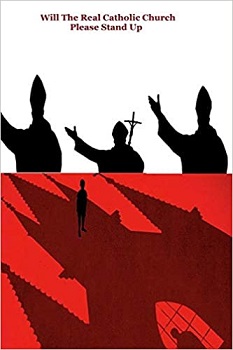









 Follow
Follow


